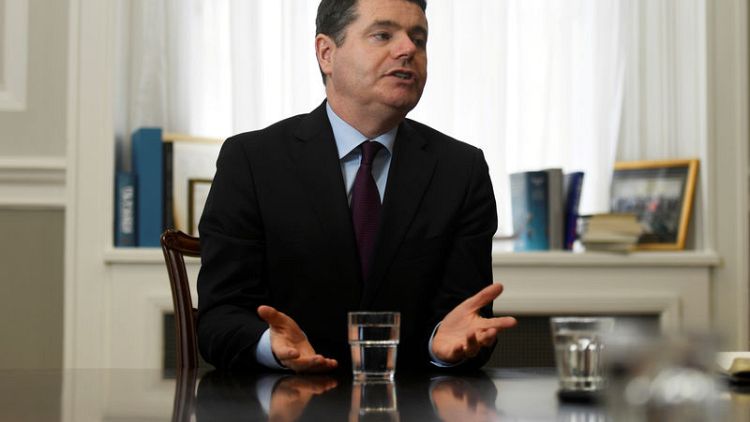By Padraic Halpin
DUBLIN (Reuters) - Ireland presented two budget strategies for 2020 on Tuesday, a preferred option that would see its budget surplus grow if its neighbour Britain leaves the EU in an orderly way, and a no-deal Brexit scenario forecasting a deficit to absorb the shock.
Ireland's finance minister usually uses the annual summer economic statement to lay out the fiscal leeway available in the following year's budget to - in the case of recent years of strong economic growth - cut taxes and increase spending and what impact that would have on the public finances.
But with 2020's budget due to be presented on Oct. 8, three weeks before Britain is due to leave the bloc, Finance Minister Paschal Donohoe handed the cabinet two options to choose from in September. No option was included for a scenario where Britain delays Brexit or calls it off altogether.
"It is fair to say that we are looking at a number of economic developments which mean that this is a particularly complicated policy environment for the government to be in," Donohoe told a news conference.
The Finance Ministry has previously forecast that a disorderly Brexit would curb Ireland's economy by up to 4.25 percentage points of gross domestic product by 2023 compared with an orderly British exit. Donohoe said he would allow the public finances to run a deficit of between 0.5 and 1.5% of GDP next year in the no-deal scenario.
It would take three to four years after a hard Brexit for the exchequer to return to surplus, the forecasts showed.
That would be a swift setback for the exchequer after Ireland only posted its first budget surplus in a decade last year. An orderly Brexit would grow that surplus to 0.4% next year, the budget plan said.
The two scenarios would accommodate a budgetary package of 2.8 billion euros (2.5 billion pounds) for 2019 - 2.1 billion of which has already been pre-committed in areas including planned infrastructure spending and increased public sector pay.
In the case of a no-deal Brexit, the budget package would involve temporary, targeted funding for the sectors most affected by the economic shock.
However Dublin faces a different challenge in that preferred scenario, with its rapidly growing economy currently at risk of overheating, and Donohoe said on Tuesday that his department were seeing some signs that this could emerge in the future.
(Reporting by Padraic Halpin; Editing by Peter Graff and Alison Williams)



